|

WHEN WOMEN RULE THE
WORLD:
HEADS WITH HEARTS
Aditha DISSANAYAKE
 American novelist Anne Roiphe wrote the following dialogue in her
book “Up the Sand Box”, way back in 1970. “What the world needs,” he
said, “is not a Joan of Arc, the kind of woman who allows herself to be
burned on the cross. That's just a bourgeois invention meant to frighten
little girls into staying home. What we require is a real female
military social leader.” American novelist Anne Roiphe wrote the following dialogue in her
book “Up the Sand Box”, way back in 1970. “What the world needs,” he
said, “is not a Joan of Arc, the kind of woman who allows herself to be
burned on the cross. That's just a bourgeois invention meant to frighten
little girls into staying home. What we require is a real female
military social leader.”
“But that” -- I smiled at him -- “is just impossible. Women are tied
to husband and children... a sword or a gun in their hands is a joke or
a mistake...Occasionally, it's true, a woman can become a volcano, but
that's about it.”
Yes, perhaps, in Roiphe's America in the 1970s the highest limits a
woman could reach would have been to erupt like a volcano every now and
then. Not so in the East.
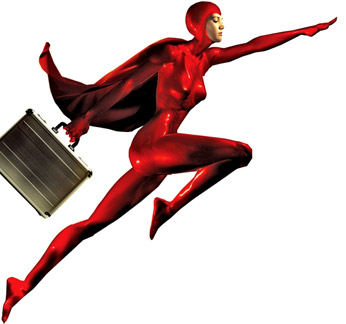 |
|
Inner
strength vs outer strength |
Three decades before Roiphe wrote “Up the Sand Box”, Mahatma Gandhi
saw women as the future leaders of human evolution. He believed only
women can bring compassion and morality into public life. “To call woman
the weaker sex is a libel; it is man's injustice to woman”, said this
sage of India. “If by strength is meant brute strength, then indeed is
woman less brute than man. If by strength is meant moral power, then
woman is immeasurably man's superior. Has she not greater intuition, is
she not more self-sacrificing, has she not greater courage? Without
woman, man could not be.”
Political dynamo
By 1960 his words had turned real. When her Prime Minister husband
was assassinated in 1959 Sirimavo Bandaranaike was transformed from shy
housewife into a political dynamo. She campaigned for her husband's
party in the 1960 elections, became its leader and was elected the first
woman head of government on July 20, 1960, six years before Indira
Gandhi became India's first woman prime minister. Her election was so
unusual that newspapers weren't sure what to call her. “There will be
need for a new word.
Presumably, we shall have to call her a Stateswoman,” London's
Evening News wrote in July 21 1960. “This is the suffragette's dream
come true. In Sept. 1961 at the Neutral Summit Talks in Belgrade,
Yugoslavia, she made history by being the first national leader to say
she was speaking “as a woman and a mother.”
She was followed by Indira Gandhi and the Iron Lady, Margaret
Thatcher. Sonia Gandhi, herself a forceful political figure in India
today recalls accompanying her husband, Rajiv Gandhi to several
Commonwealth Heads of Government Meetings (CHOGM) when Margaret Thatcher
was holding the reigns of Britain in her hands. “ I remember some of the
colorful episodes that took place behind the scenes,” said Sonia Gandhi
in the speech she made at the Commonwealth Meeting in 2011. “To give you
just one example, at the 1985 CHOGM in the Bahamas, the issue of
sanctions against South Africa dominated the discussions.
Margaret Thatcher stood out in solitary opposition to the rest of the
Commonwealth's call for sanctions against the apartheid regime.
At the weekend retreat, Shridath Ramphal put together a three-member
team to talk informally to Mrs. Thatcher and persuade her to relent.
They were Rajiv Gandhi, Brian Mulroney of Canada and Robert Hawke of
Australia, selected by him apparently as much for their looks as their
political weight.” “In private, he jokingly told them: ? She will not be
able to resist the three best-looking men of the Conference. The Iron
Lady was unmoved and the handsome threesome failed either to charm or to
persuade her. Thus was the stage set for the most heated political
confrontation in the Commonwealth's history.”
Best qualified leaders
The end of 2012 saw the global leadership of woman stretching far and
wide, from the most prosperous of nations to smaller, aid-supported
countries. Cristina Fernandez de Kirchner, president of Argentina; Aung
San Suu Kyi, the general secretary of the National League of Democracy
in Burma; Julia Gillard, Prime Minister of Australia, Yingluck
Shinawatra, prime minister of Thailand; Joyce Banda, President of Malawi
and Ellen Johnson-Sirleaf, president of Liberia; all prove that women
are fast becoming the best qualified leaders of the world. For the
second year running, three of the top five women on the FORBES list of
the world's 100 most powerful women were politicians. In the list as a
whole, 19 politicians held court, including eight heads of state.
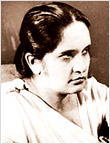 |
|
Sirimavo
Bandaranaike |
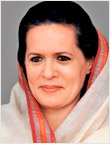 |
|
Sonia
Gandhi |
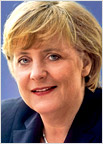 |
|
Angela
Merkel |
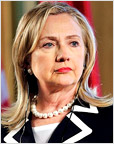 |
|
Hilary
Clinton |
Holding the place of No. 2 on the list for the second year was the
former U.S. Secretary of State Hillary Clinton. As the world ambassador
of the largest single economy on earth, Clinton had advanced U.S.
interests and policies overseas while pushing women's issues,
development and education to the top of the foreign policy agenda.
In an article in the Forbes magazine Greta Van Susteren, a fellow
Power Woman and friend of Clinton is recorded as saying Hilary Clinton's
notoriety on the international stage is unparalleled, and makes her
different from any of her predecessors.
“[Clinton] might as well be the President of the United States,” she
said. “The whole world knows her.
Brazil's president, Dilma Rousseff was the third most powerful woman
in the world in 2012 according to the Forbes list, from her perch atop
the world's eighth biggest economy. Specially so as Brazli will host the
2014 World Cup and 2016 Olympics- with Rousseff at the helm of the
country.
Also in the top ten most powerful women in 2012, are Sonia Gandhi,
the president of the Indian National Congress Party, and Janet
Napolitano, the first female head of the Department of Homeland Security
and the woman responsible for keeping America's borders (air, land, sea
and cyber) well-defended.
But the topmost niche on the list is held by the lady “who holds the
world in her hands.” Lauded as the most powerful woman in Europe during
the past five years, Angela Merkel,the first ever female German
Chancellor, is seen as a political record breaker, who is credited with
competently steering Germany out of the recession.
How did she climb the political ladder no woman had stepped on,
before her in Germany? Who was the driving force behind her political
ambitions? Days after she became Germany's first woman leader, one of
the biggest papers in Germany, Bild-Zeitung, questioned, “Where is
Merkel's man?” But her husband, Joachim Sauer, one of Germany's most
eminent quantum chemists had decided his place was not in the spotlight.
In fact, he has kept a low profile ever since, famously refusing to
attend her inauguration as Chancellor because he was working at his
laboratory at the Humboldt University in Berlin. “He has, however, been
a strong support to her during a leadership that has lasted longer than
many expected,” observes The Times’ former German correspondent, Anne
McElvoy.
Husband's role
Same is true of Sir Denis Thatcher. He too kept a low profile,
refused press interviews, made only brief speeches, and saw his role as
that of helping his wife to survive the stress of her job. When he did
speak to the press, he called Margaret “The Boss”. She on the other
hand, often acknowledged her husband's support. In her autobiography she
wrote: “I could never have been Prime Minister for more than 11 years
without Denis by my side.”
Back to Merkel. So, what's the secret of her success? Almost all
political analysts agree she is, in many ways, the perfect leader for
tough times. Even after a second election victory, her down-to-earth
style has remained intact and she admits she still stockpiles food and
cleaning products, a habit formed during her years living in communist
East Germany. Visitors to her office can often find the most powerful
woman in Europe serving them coffee or tea. “There is an intellectual
self-confidence in her that is unshakeable,” says German commentator
Hans-Ulrich Jörges. As political writer Sonia Purnell says, “While
Thatcher always felt and sounded like a pioneer woman politician, Merkel
has perhaps made the idea of a woman leading her country feel normal.”
As we move into 2013 the future looks better than never before for
women leaders. As it was in the past, from Cleopatra of Egypt, to
Empress Wu Zetian of China, to Queen Elizabeth I of England, women who
climb to power continue to show an astonishingly high success rate.
Surely their leadership prowess, at times, can put men's records to
shame.
[email protected]
Why giving MEN anonymity in rape cases is a bad idea
A senior lawyer has called for anonymity until conviction for men
accused of sex crimes. This would make it even harder for victims to get
justice
The chairwoman of the bar council, Maura McGowan QC, has called for
anonymity until conviction for men accused of rape. Women (and victims
are overwhelmingly women and children) who report rape are granted
anonymity, so why not afford the same protection to those they accuse?
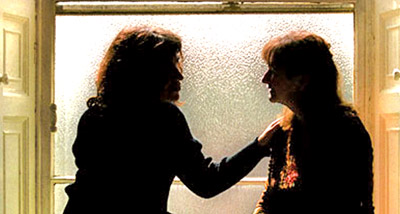 |
|
Rape
remains uniquely stigmatising for the victim.’
Picture by Adrian Sherratt/Alamy |
Because it is not the same. Rape remains uniquely stigmatising for
the victim - in many countries rape is still treated as a stain on
family honour, and some victims are even killed. While the anti-rape
movement has improved public attitudes in Britain - and they are being
further shaken right now in India and elsewhere - the conviction rate
remains shamefully low. Only 6.5% of reported rapes end in a rape
conviction.
Fair game
Although it is now acknowledged that rape is a particularly traumatic
form of violence, in court a rape victim's character remains fair game
for defence barristers. The victim has no one to defend her from the
most intimate questioning; she is merely a witness for an often
incompetent and indifferent Crown Prosecution Service (CPS). And while
the law is supposed to protect her from irrelevant questioning on her
sexual history, “belief in consent” is a permissible defence, and bias
among judges is common.
he tragic suicide of Frances Andrade, who was sexually assaulted as a
child, followed her aggressive questioning by defence barristers. That
the judge found nothing wrong with Andrade's cross-examination
illustrates just how brutal rape trials often are, and why so many
victims are denied justice. Andrade was told not to seek counselling
before the trial. Women have sometimes been warned against any contact
with Women Against Rape, the advice and advocacy group I work for.
McGowan is quite wrong, meanwhile, to claim that men accused of rape
are a special case because of the stigma they face. Accusations of
terrorism, murder, and violence against children are no less grave, and
the consequences for anyone unfairly accused no less traumatic. Ask
Colin Stagg. If all defendants were given anonymity, open justice would
end - and with it, our biggest protection against the abuse of power.
Difficulties
And yet anonymity for men accused of rape is an idea that keeps
coming back. It was introduced into law by a Labour government in 1976,
and repealed by the Tories in 1988. Police said then, and say now, that
anonymity hampers investigations and prevents public appeals for victims
of serial rapists to come forward. As McGowan concedes, the child
victims of Jimmy Savile demonstrate the benefit of suspects being named
- until Savile was named, many of his victims had told no one while
others had been punished for speaking out. The same has been true in
Rochdale, Carlisle, Reading, Oxford ...
Anonymity for defendants reared its head again when it became Lib Dem
party policy in 2006, and in 2010 the coalition government proposed
reintroducing it into law. Women were outraged, including women MPs of
all parties, and the government had to withdraw. Their proposal, like
McGowan's, and the vicious cross-examination in rape cases, all rely on
the diehard myth that women often lie about rape. Home Office research
estimates that only around 3% of rape allegations are false, yet the
illusion persists that false allegations are widespread, and men the
real victims.
In fact, it is extremely hard to report rape, and 85% of victims
never do. Those who do report are often dismissed by police and
prosecutors. Increasingly, victims tell us they were pressed to retract.
Worse: any woman whose rapist is not convicted can be accused of making
a false allegation and prosecuted, especially if she has reported rape
in the past. Gail Sherwood and Layla Ibrahim were jailed after reporting
rape by unknown strangers. Both say they were pressed to retract and
prosecuted when they refused. We are campaigning to clear their names.
Two years ago the CPS was publicly shamed for prosecuting women in
this way, when a wife was jailed for accusing her rapist husband and
then withdrawing the allegation. They called it a “false retraction”.
The director of public prosecutions responded by introducing guidelines
for prosecutors, but at Women Against Rape we still get calls from
victims who are suicidal because they are facing prosecution. Some are
unwell after years of child rape, others tried to withdraw when they
found hostile interrogation too much to bear.
As chair of the bar council, a body that claims to promote “fair
access to justice for all”, McGowan would do better to concern herself
with how many rapists get away with it.
- Guardian.co.uk
|







